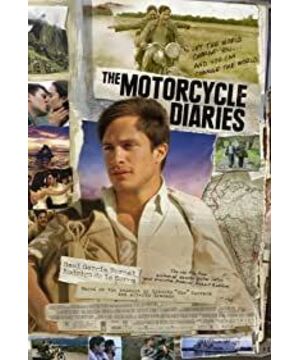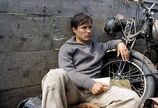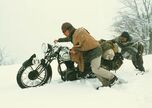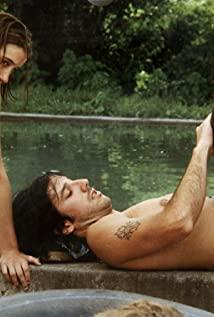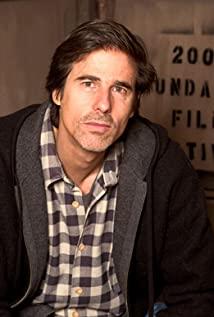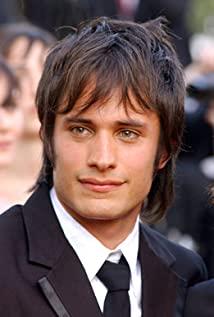Many years ago, I found that I had lost my ideals, angry and decadent in the air of reality. Then in the long growth years, all my spirit was wasted and vanished, and then I slowly struggled in the low ebb. At the moment when the water surfaced, I was eager to find a sustenance. It seemed that all heroic idols were flashy, and I was no longer willing to worship. Do you know that losing your ideals means that you can't even daydream, and people seem to have become a lonely wandering soul, or a walking corpse, who can't see the light, only the darkness in front of them. I think this kind of life is going down into more and more serious depression, and one day I will shoot myself like Hemingway, but I don't even have a gun, there is only other way to choose.
Ideals are so important to our lives, even if ideals are just to deceive ourselves, it is good to be able to deceive ourselves. We need to look for ideals, we need to look for beliefs, maybe they will fall apart in the years to come, and we still need to create a utopia for ourselves every moment, so that we can live with meaning. Therefore, people with ideals are happy, even if they sacrifice their lives for the ideal, they are still happy.
Here is a movie about the creation of an ideal by a young man who has always believed in his ideal, and he will always strive for this ideal until he falls. He chases his own sun like Kuafu, never stops, and he can leave happily until he falls down. People say he is at least worthy of pride.
The idolization of
Che Guevara I didn't hear the name Che Guevara at first, it came to my eyes when young people in the street were walking around wearing cultural shirts with his image on it, and then it was frequent everywhere. Meet this name and this familiar avatar. The curiosity of all people drives me to find out who this big star is.
Never thought that Guevara was a revolutionary martyr and a red Marxist. Taking a closer look, he actually visited China as the official representative of Cuba and met with Chairman Mao. It is so strange that such a hero closely associated with communism is unknown to us, but has become an icon in the Western world, and we know him more from the West. I think too many young people wear Guevara's head clothes and know nothing about him, this cultural icon, and I want to understand the reasons for his idolization.
Among the countless revolutionary martyrs who threw their heads and shed their blood, why only Che Guevara stood out as an idol in the eyes of the younger generation. Looking at his life, I think everything is inseparable from his personal personality and temperament, and more importantly, he is extremely firm in his ideals and beliefs and persistence. Even those revolutionaries who are willing to throw their heads and shed their blood, few people like him give up the results of their efforts and continue to pursue their own ideals. Being able to regard fame and fortune as dung is his otherworldliness. As the Cuban leadership, he is reluctant to stop and enjoy the fruits of victory and slowly degenerate himself. He gave up all success and continued to fight for his ideals. He is a person who exists for ideals. How broad is his ideal, as an Argentine, he is reluctant to stay somewhere, and finally let his life end because of his ideal. Such a revolutionary is a perfect ideal, and it seems natural to be an idol.
The road movie
is not actually a related revolution movie, its significance is to remove the mythological flavor of Che Guevara, "Motorcycle Diary" is still a road movie in the final analysis. Started in January 1952, traveled more than 20,000 kilometers in 8 months, and bumped on a Norton 500 motorcycle. After the car was completely scrapped, on foot, by boat, and hitchhiking, Guevara and his friends had a hard, twisty but romantic journey. Before becoming "Che", Guevara took his youth on the road, only to explore the unknown and experience life.
The scenery of South America flashed before my eyes, and I kept rushing according to the plan. The time became blurred, and there was only the dust of young people all the way. Watching the two young men take turns driving a broken car, falling down and getting up, galloping on the vast grassland highway between the sky and the earth. From the vast grasslands to the snow-capped mountains, and the Amazon River in the rainy season, camcorders record the scenery of South America, allowing us to experience the scenery on the other side of the earth. Besides the terroir, there are more human feelings, and the passionate and unrestrained South American women are the customs that cannot be ignored during the journey, and the mysterious culture of the Inca aboriginal people is surprising in Machu Picchu.
Keep moving forward, the more local customs and living conditions bring more thinking, the protagonists start to think, start to be confused, and their hearts start to change subtly. Road movies always bring thinking and changes as they move forward, and such a journey also determines the protagonist Guevara's wandering life. At that moment in his life, he has decided to integrate into Latin America, and even into the world. Stop somewhere.
The film "Motorcycle Diary" was adapted from Guevara's travel diary in his youth, and all the shooting followed Guevara's road journey when he was young . From Argentina to Chile, and from Chile to Peru, all the way down the road to experience and show to the audience. The style of the film is somewhat between a feature film and a documentary. I believe that the story described in the film is true. After all, the director also found Granado, one of the protagonists of the film, and asked him about the details of the whole journey, and asked him As a consultant for the film to find the problem, the experience of Guevara and Granardo was restored to the greatest extent.
The film doesn't want to give us a hero image, and we don't want to know the deified Guevara, the frivolous young man who can't dance, maybe the real side we want to know. Guevara, from a privileged family, was excited at the moment of saying goodbye to his parents and embarking on the journey. This is a common problem for all young people. The desire for the unknown world is always accompanied by impulse. In the early days of their journey, Guevara even rushed to his girlfriend's house to enjoy the tenderness. The film shows us an ordinary young man with no sign of becoming a hero. In the ensuing journey, Granado shows us a worldly smoothness, while Guevara shows a green straightness. The interesting thing is that the difficulties that occurred during the journey made them all change, and Guevara also began to lie. It turns out that people in this world always like to hear beautiful lies more than truth.
There is a quality in the two young people called persistence. No matter how difficult the journey was, they did not give up. It was just that they were excited when they entered Chile, but they were only numb when they entered Peru. Change happens unexpectedly.
The Guevara shown in the two paragraphs before and after the film is different. The young boy in the first half has changed in the middle of the film, and his world view has also changed. When he was discriminated against during his journey, the poor people he saw along the way, and the aboriginal life was exploited, all the injustices in the world changed his life goals. I remembered Mr. Lu Xun's numbness when he saw Chinese people being killed when he was studying medicine. Since then, he gave up medicine and started writing, and used his pen to save the souls of Chinese people. And Guevara's transformation was also because of what he saw. He abandoned the doctor and joined the revolution because he saw that being a doctor can't change the injustice in the world. He believes that only through revolution can the world be changed. As he said at Machu Picchu: "Revolution without guns is impossible." Revolutionary beliefs took shape at that moment.
In the film, Guevara gradually became silent in the second half of the film, and his facial expressions became more and more solemn, which was quite different from the wild youth in the first half. This change became more and more obvious in Guevara, and when he came to the treatment center for lepers, the change was frozen and magnified. It was as if a revolutionary belief had been established, as his speech at the birthday party and his swim to the leper's place fully reflected his determination and will. The whole film completes Guevara's change of mind from an ordinary person to a revolutionary. Although such a journey is not long, it is the key to affecting Guevara's future life.
Regarding the director, actors and others
From the perspective of this film, Walter Sellers is obviously very good at describing the characters in detail. His works are very textured, and that kind of picture makes people feel very distinctive at first glance. Latin American style. Just like his most outstanding masterpiece "Central Station", the lens language with deep concern for low-level civilians is also conveyed through Guevara's eyes in "Motorcycle Diary". He did not portray Guevara as a hero, but created an extraordinary temperament in the ordinary Guevara. He also balanced the roles and priorities between Guevara and his friend Granado. Although Guevara is the protagonist of course, this road story did not start around him alone. Doo is also valued as an important part of the story. Sellers is using the film to show a real experience, and he also never forgets that this is a road trip of two people, and is also telling every audience that this is the youth story of two people.
I think Cyrus's presentation of Guevara's personality in the film is the most distinctive, and he brings us a Guevara with a very distinctive character. We saw the courage and honesty of a young man when he bluntly criticized the poor writing of a professor who had helped them so much. We see a young man of perseverance as he swims across a wide river to the other side. We get a glimpse of the young man's visceral sense of equality, when he refuses to shake hands with a leper with gloves, and when he is friendly with the Aboriginal people.
When director Sellers crafted Guevara in the film so carefully, it took a person to express it all. Gael Garcia is the first Latin male star I know, I don't know if he is the best, but for now he is the Latin male star of choice for all directors. He actually played Guevara in 2002, but it wasn't that famous. For the character of Guevara, Garcia is slightly young, but for Guevara who has not yet become Che in "Motorcycle Diary", Garcia is more competent. He successfully grasped the different temperaments of Guevara in the two stages before and after the film. The innocence in the first half turned into melancholy in the second half, and he successfully interpreted the transformation of temperament. I've seen most of his films, standing out from "Your Mother Too", and then succeeded in "Love is a Son of a Son", "Bad Education" and many other works, almost every role has never been disappointing. . Gael Garcia is not handsome, but his future can almost be said to be very promising. When we turn more attention to Garcia, who has become a star, we still can't ignore the romantic Granardo, although not too famous, but Rodrigo de la Senna's performance is also very good , his humorous performance makes people's eyes shine, and the story might be a little dull without him.
Numerous elements make up the success of this film, the director, actors, and photography. The film truly reproduces a convincing Guevara, rather than a hero who lives in praise. The film takes off the hero's coat and draws it. away from his true humanity. As a third-party film, I think their perspective is more objective. This hero who pursues ideals is full of wastefulness and faithful belief. In fact, the brilliance of his body has not only stayed in the communist he pursued, but more broadly expressed in his own mind and personality.
Text: Between the eyebrows
View more about The Motorcycle Diaries reviews


